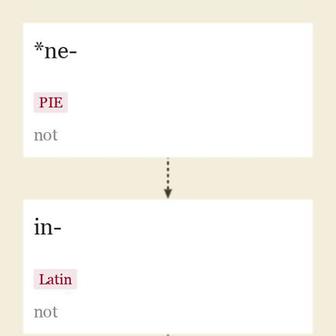incommunicado (adj./adv.)
1844, American English, from Spanish incomunicado, past participle of incomunicar "deprive of communication," from in- "not" (see in- (1)) + comunicar "communicate," from Latin communicare "to share, impart," literally "to make common," related to communis "common, public, general" (see common (adj.)).
Entries linking to incommunicado
c. 1300, "belonging to all, owned or used jointly, general, of a public nature or character," from Old French comun "common, general, free, open, public" (9c., Modern French commun), from Latin communis "in common, public, shared by all or many; general, not specific; familiar, not pretentious." This is from a reconstructed PIE compound *ko-moin-i- "held in common," compound adjective formed from *ko- "together" + *moi-n-, suffixed form of root *mei- (1) "to change, go, move," hence literally "shared by all."
The second element of the compound also is the source of Latin munia "duties, public duties, functions," those related to munia "office." Perhaps reinforced in Old French by the Germanic form of PIE *ko-moin-i- (compare German gemein, Old English gemne "common, public, general, universal;" see mean (adj.)), which came to French via Frankish.
Used disparagingly of women and criminals since c. 1300. Meaning "pertaining equally to or proceeding equally from two or more" is from c. 1400. Meaning "usual, not exceptional, of frequent occurrence" is from late 14c. Sense of "not distinguished, belonging to the general mass" is from c. 1400; of things, "ordinary, not excellent," late 14c.
Common pleas is 13c., from Anglo-French communs plets, hearing civil actions by one subject against another as opposed to pleas of the crown. Common prayer is that done in public in unity with other worshipers; contrasted with private prayer. Common stock is attested from 1888. Common speech (late 14c.) is the vernacular, as opposed to Latin. Common good (late 14c.) translates Latin bonum publicum "the common weal." The college common room (1660s) is one to which all members have common access.
word-forming element meaning "not, opposite of, without" (also im-, il-, ir- by assimilation of -n- with following consonant, a tendency which began in later Latin), from Latin in- "not," cognate with Greek an-, Old English un-, all from PIE root *ne- "not."
In Old French and Middle English often en-, but most of these forms have not survived in Modern English, and the few that do (enemy, for instance) no longer are felt as negative. The rule of thumb in English has been to use in- with obviously Latin elements, un- with native or nativized ones.
Proto-Indo-European root meaning "to change, go, move," "with derivatives referring to the exchange of goods and services within a society as regulated by custom or law" [Watkins].
It forms all or part of: amiss; amoeba; azimuth; common; commune; communicate; communication; communism; commute; congee; demean; emigrate; emigration; excommunicate; excommunication; immune; immutable; incommunicado; mad; mean (adj.1) "low-quality;" mew (n.2) "cage;" mews; migrate; migration; mis- (1) "bad, wrong;" mistake; Mithras; molt; Mstislav; municipal; munificent; mutable; mutant; mutate; mutation; mutatis mutandis; mutual; permeable; permeate; permutation; permute; remunerate; remuneration; transmutation; transmute; zenith.
It is the hypothetical source of/evidence for its existence is provided by: Sanskrit methati "changes, alternates, joins, meets;" Avestan mitho "perverted, false;" Hittite mutai- "be changed into;" Latin mutare "to change," meare "to go, pass," migrare "to move from one place to another," mutuus "done in exchange;" Old Church Slavonic mite "alternately;" Czech mijim "to go by, pass by," Polish mijać "avoid;" Gothic maidjan "to change."
Trends of incommunicado
More to Explore
updated on September 28, 2017
Trending words
Dictionary entries near incommunicado
incommensurate
incommodious
incommodity
incommunicability
incommunicable
incommunicado
incomparability
incomparable
incompatibility
incompatible
incompetence


